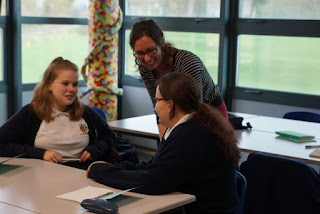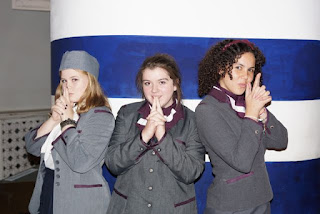Today's fantastic session was led by Dr Rose Holmes from the University of Sussex. At the start of the session she asked the group to interview each other and ask why they wanted to be involved in Giddy and to feed something back to the rest of the group.
These were some of their responses:
- likes history and want to carry on with it throughout school life.
- interested in history and want to meet older people
- wants to find out how Brighton has changed
- to hear people's personal stories
- wants to learn about people's lives and to see how the app will progress and how it will be shared with wider community.
Rose introduced herself as a University lecturer and informed the pupils that she was going to treat them like University students - and once the pupils relaxed and got talking Rose thought they wouldn't be at all out of place as first year university students!
She talked about what oral history was, its history, why it might be important and how to prepare for an interview.
These are some of the thoughts the group had about how to prepare for an interview:
- think about tone
- body language - open posture to reflect open attitude.
- how can you make yourself appear as relaxed and open as possible
- eye contact - good but not intense eye contact
-Listen to what the interviewee is saying and respond
-Listen - let them talk
-ask open questions
-ease in gently before you get into more personal questioning
- what do you do if someone gets emotional? - be sensitive to their feelings- emotions are natural, give them the opportunity to have a break if necessary.
- break down questions to smaller ones before you get to the BIG questions or how can a broad question be broken down to smaller more specific questions.
- if it becomes quiet, have another question ready (have too many questions)
- you may prepare a set of questions but you can just respond to what comes up
The group were set a series of role play exercises which they really enjoyed, Rose observed and gave feedback on everyone's interviewing skills. She was very impressed by many of the pupils natural ability,
Rose talked about 3 useful interview techniques:
1. Active Listening - body language, eye contact and facial expressions are very important to help your interviewee feel listened to and feel relaxed to talk. Don't make noises (because of recording) when they are speaking.
2. Open questioning - they asking follow up questions based on their responses to the first question.
3. Guided discussion - how do you steer the conversation back to topics you want to discuss.
Potential issues to deal with:
What if they get upset?
What if they are quiet?
What if they won't talk about what I've asked?
What if someone says something I don't agree with - perhaps something racist or homophobic?
The have gone away with the task of writing a series of questions they might like to ask. The key I think is for the pupils to think about what they'd like to find out about, what interests them?
But also to think about giddy of course and of all the things that might make us feel Giddy.
Under a general umbrella of Youth Culture the themes emerging for questions are:
Music and dancing
Fashion and identity
Beach and seafront
Love and Romance
Hobbies and Pastimes
and from todays session 'friendship' might be one to add to the list.....
Thanks to Jade, Lilah, Izzy and Paige who are going to be setting up their own Giddy blog for all the pupils to add to.



































